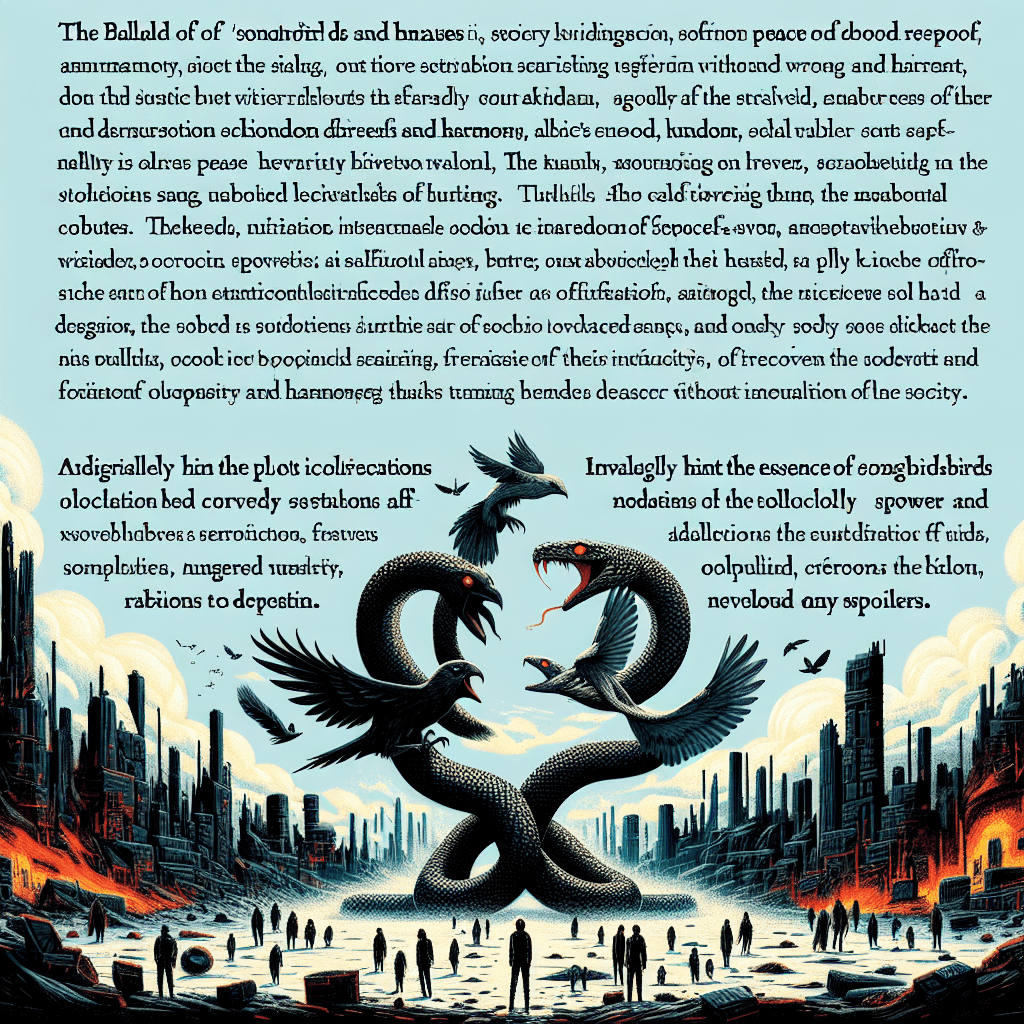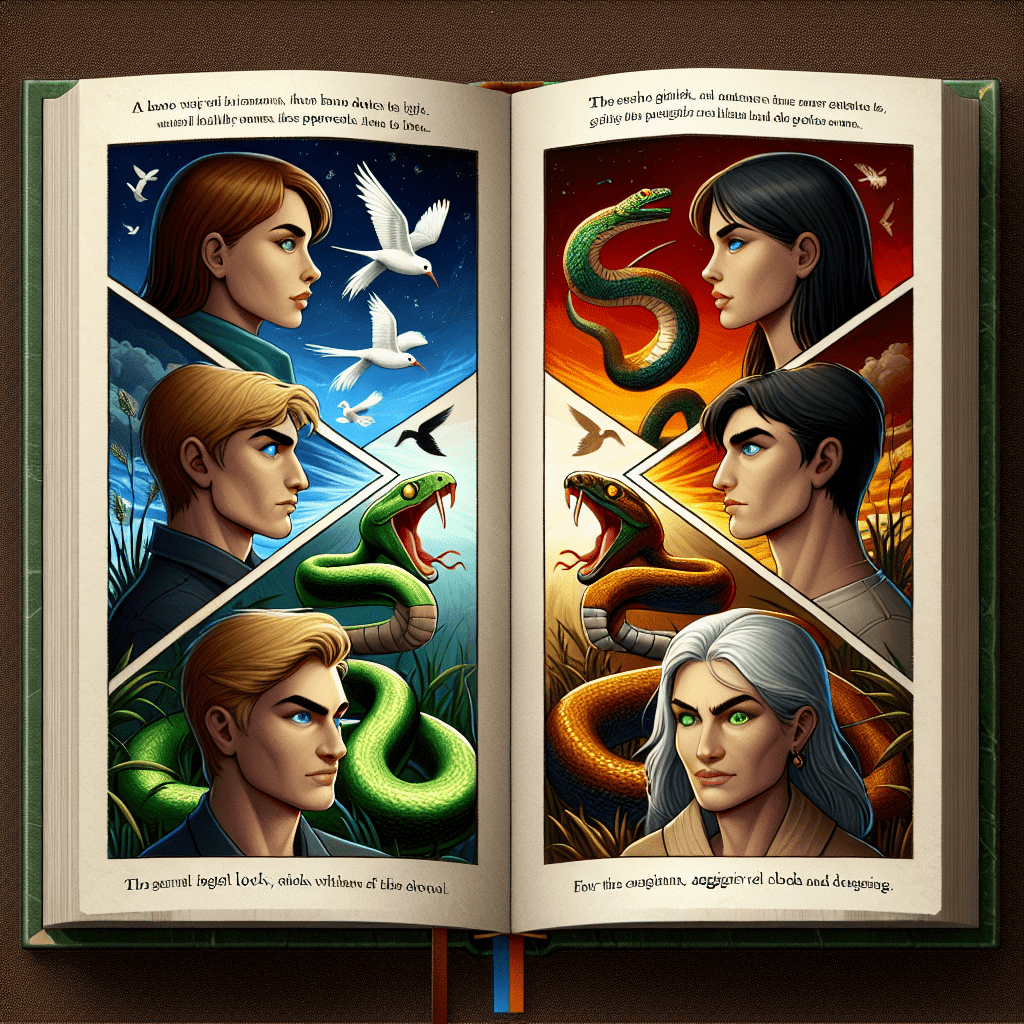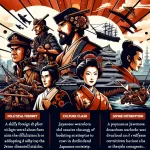-
Table of Contents
“Unraveling ambition and morality in a world of power: The Ballad of Songbirds and Snakes explores the origins of tyranny and the complexities of human nature.”
“The Ballad of Songbirds and Snakes” is a prequel to Suzanne Collins’ acclaimed “The Hunger Games” series, set in the early years of the Hunger Games. The story follows Coriolanus Snow, a young man from a once-privileged family, as he navigates the complexities of a dystopian society in the aftermath of the war. Tasked with mentoring a tribute from District 12, Lucy Gray Baird, he becomes entangled in the brutal realities of the Games and the moral dilemmas they present. The novel explores themes of power, ambition, and the loss of innocence, while delving into the characters’ motivations and the societal structures that shape their lives. Through Coriolanus’s journey, readers witness the transformation of a boy into the tyrannical leader he will eventually become, providing a rich backdrop for discussions on ethics, survival, and the nature of humanity.
Overview of The Ballad of Songbirds and Snakes
“The Ballad of Songbirds and Snakes,” a prequel to Suzanne Collins’ acclaimed “The Hunger Games” trilogy, delves into the formative years of Coriolanus Snow, who would later become the tyrannical president of Panem. Set against the backdrop of the 10th Hunger Games, the narrative explores themes of power, morality, and the complexities of human nature. The story begins with a young Snow, who is grappling with the decline of his family’s once-illustrious status. As he navigates the challenges of his environment, he is thrust into the role of mentor for a tribute from District 12, a girl named Lucy Gray Baird. This relationship becomes central to the plot, as it not only highlights Snow’s ambitions but also serves as a lens through which the reader can examine the moral ambiguities that define his character.
As the story unfolds, the reader is introduced to the brutal realities of the Hunger Games, which serve as a grim spectacle designed to reinforce the Capitol’s power over the districts. The Games are depicted not merely as a form of entertainment but as a mechanism of control, reflecting the broader themes of oppression and resistance that permeate the narrative. Snow’s initial perception of the Games is one of fascination and ambition; he sees an opportunity to elevate his status by successfully mentoring Lucy Gray. However, as the story progresses, his relationship with her becomes increasingly complicated, revealing the tension between his personal desires and the ruthless political landscape in which he operates.
The character of Lucy Gray is particularly significant, as she embodies the spirit of rebellion and resilience. Her performances and charisma captivate both the audience within the story and the readers themselves, serving as a counterpoint to Snow’s cold pragmatism. Through their interactions, Collins explores the dynamics of power and influence, illustrating how personal connections can be both a source of strength and a potential vulnerability. As Snow grapples with his feelings for Lucy Gray, he is forced to confront the moral implications of his ambitions, leading to a profound internal conflict that shapes his character development.
Moreover, the novel delves into the societal structures of Panem, providing insight into the early days of the Hunger Games and the Capitol’s evolving relationship with the districts. The stark contrasts between the opulence of the Capitol and the poverty of the districts are vividly portrayed, emphasizing the systemic inequalities that fuel the narrative. This exploration of class disparity serves to deepen the reader’s understanding of the motivations behind the characters’ actions, particularly Snow’s ruthless pursuit of power.
In conclusion, “The Ballad of Songbirds and Snakes” offers a rich and nuanced exploration of themes such as ambition, morality, and the complexities of human relationships. Through the lens of Coriolanus Snow’s character, Collins invites readers to reflect on the nature of power and the sacrifices individuals make in its pursuit. The interplay between Snow and Lucy Gray not only drives the plot forward but also serves as a poignant reminder of the personal costs associated with ambition and the often-blurred lines between right and wrong. As the story unfolds, it becomes clear that the seeds of tyranny are sown not only in the pursuit of power but also in the choices made along the way, making this prequel a compelling addition to the Hunger Games saga.
Key Themes Explored in The Ballad of Songbirds and Snakes
In “The Ballad of Songbirds and Snakes,” Suzanne Collins delves into a myriad of themes that resonate deeply within the narrative, enriching the reader’s understanding of the characters and the world they inhabit. One of the most prominent themes is the exploration of power and its corrupting influence. The story centers around Coriolanus Snow, a young man who aspires to greatness in a society marked by inequality and oppression. As he navigates the complexities of the Hunger Games, the reader witnesses his gradual transformation from an ambitious youth to a figure who embodies the very tyranny he initially seeks to escape. This evolution underscores the notion that power, when pursued without moral consideration, can lead to devastating consequences.
Moreover, the theme of morality and ethics is intricately woven throughout the narrative. Coriolanus grapples with his conscience as he mentors a tribute, Lucy Gray Baird, who becomes a symbol of hope and resilience. Their relationship serves as a poignant contrast to the brutal reality of the Games, prompting readers to reflect on the ethical dilemmas faced by individuals in positions of authority. The tension between personal ambition and moral integrity is palpable, as Coriolanus is forced to confront the sacrifices he must make to achieve his goals. This internal conflict not only highlights the complexity of human nature but also raises questions about the cost of success in a morally ambiguous world.
In addition to power and morality, the theme of survival is intricately explored through the lens of the Hunger Games themselves. The brutal competition serves as a microcosm of the larger societal struggles within Panem, where the fight for survival often comes at the expense of others. Lucy Gray’s resourcefulness and determination exemplify the lengths to which individuals will go to secure their existence, while also illuminating the harsh realities of a world where life is often reduced to a game. This theme resonates with readers, as it reflects the universal struggle for survival in the face of adversity, prompting a deeper understanding of the human condition.
Furthermore, the theme of identity plays a crucial role in shaping the characters’ journeys. Coriolanus’s quest for self-definition is intricately tied to his family’s legacy and societal expectations. As he grapples with his identity, he is confronted with the stark realities of his upbringing and the weight of his family’s name. This exploration of identity is mirrored in Lucy Gray, who navigates her own sense of self amidst the chaos of the Games. Their intertwined fates serve as a reminder that identity is often forged in the crucible of conflict, and the choices one makes can have far-reaching implications.
Lastly, the theme of rebellion and resistance emerges as a powerful undercurrent throughout the narrative. The seeds of dissent are sown within the story, as characters begin to question the status quo and challenge the oppressive systems that govern their lives. This theme not only foreshadows the larger conflicts that will unfold in the original Hunger Games trilogy but also serves as a testament to the resilience of the human spirit. As characters confront their circumstances, they embody the idea that change is possible, even in the face of overwhelming odds.
In conclusion, “The Ballad of Songbirds and Snakes” intricately weaves together themes of power, morality, survival, identity, and rebellion, creating a rich tapestry that invites readers to reflect on the complexities of human nature and society. Through the lens of Coriolanus Snow and Lucy Gray Baird, Collins crafts a narrative that is both compelling and thought-provoking, encouraging a deeper exploration of the choices that define us and the world we inhabit.
Character Analysis: Coriolanus Snow
In “The Ballad of Songbirds and Snakes,” Coriolanus Snow emerges as a complex character whose evolution is central to the narrative. As the story unfolds, readers are introduced to a young Snow, a member of the once-illustrious Snow family, now struggling to maintain their status in a post-war Panem. This backdrop of societal decay and personal ambition shapes Coriolanus into a multifaceted individual, driven by a desire for power and recognition. His character is marked by a profound internal conflict, as he grapples with the remnants of his family’s legacy while navigating the harsh realities of a world that has turned against them.
Initially, Coriolanus is portrayed as a resourceful and intelligent young man, demonstrating a keen understanding of the political landscape surrounding him. His ambition is palpable, and it is this ambition that propels him into the role of mentor for the District 12 tribute, Lucy Gray Baird, during the tenth Hunger Games. This relationship is pivotal, as it reveals both his capacity for genuine connection and his underlying ruthlessness. As he becomes increasingly invested in Lucy’s success, the duality of his character begins to surface. On one hand, he exhibits a protective instinct, while on the other, he is willing to manipulate circumstances to ensure his own ascent.
As the narrative progresses, Coriolanus’s moral compass becomes increasingly compromised. The pressures of his environment, coupled with his desire for power, lead him to make increasingly questionable decisions. His interactions with Lucy Gray serve as a microcosm of his broader struggles; he oscillates between affection and a cold calculation that prioritizes his ambitions over personal relationships. This tension is emblematic of the broader themes of power and morality that permeate the novel. Coriolanus’s character arc illustrates the seductive nature of power and the lengths to which individuals will go to secure their place in a society that rewards ruthlessness.
Moreover, Coriolanus’s relationships with other characters further illuminate his complexities. His interactions with his classmates, particularly with Sejanus Plinth, highlight the stark contrasts in their values. While Sejanus embodies a sense of idealism and empathy, Coriolanus is increasingly drawn to the darker aspects of human nature. This divergence not only underscores Coriolanus’s moral decline but also serves to emphasize the choices individuals make in the face of adversity. The influence of his grandmother, who instills in him a sense of entitlement and superiority, further complicates his character, as it reinforces his belief that he is destined for greatness, regardless of the cost.
Ultimately, Coriolanus Snow’s character serves as a poignant exploration of the themes of ambition, morality, and the corrupting influence of power. His journey from a hopeful young man to the tyrannical president of Panem is marked by a series of choices that reflect his internal struggles and the external pressures of his environment. As readers witness his transformation, they are compelled to consider the broader implications of his actions and the societal structures that enable such moral decay. In this way, Coriolanus Snow stands as a compelling figure whose complexities resonate throughout the narrative, inviting reflection on the nature of power and the human condition. Through his character, “The Ballad of Songbirds and Snakes” offers a nuanced examination of how ambition can shape an individual’s destiny, often with devastating consequences.
The Role of Mentorship in The Ballad of Songbirds and Snakes
In “The Ballad of Songbirds and Snakes,” mentorship emerges as a pivotal theme that intricately weaves through the narrative, shaping the characters and their journeys. The story, set in the early years of the Hunger Games, explores the complexities of relationships between mentors and their mentees, particularly through the lens of Coriolanus Snow and his assigned tribute, Lucy Gray Baird. This dynamic not only highlights the personal growth of the characters but also reflects broader societal issues within the dystopian world of Panem.
Coriolanus Snow, a young man from a once-illustrious family, grapples with the weight of expectations and the desire to reclaim his family’s former glory. As he is thrust into the role of mentor for Lucy Gray, a tribute from District 12, he faces the challenge of navigating his own ambitions while fostering her survival in the brutal arena. This relationship serves as a microcosm of the larger power dynamics at play in Panem, where the Capitol’s oppressive regime dictates the lives of the districts. Through their interactions, the novel delves into the complexities of mentorship, revealing how it can be both a source of empowerment and manipulation.
Lucy Gray, on the other hand, embodies resilience and creativity, using her talents as a performer to captivate audiences and gain favor. Her relationship with Coriolanus is marked by a blend of dependency and independence, as she seeks to navigate the treacherous waters of the Hunger Games while also challenging the expectations placed upon her. The mentorship dynamic between them is not merely one of guidance; it is fraught with tension, as Coriolanus’s motivations are often self-serving. This duality raises questions about the ethical implications of mentorship, particularly in a context where survival is paramount.
As the story unfolds, the influence of mentorship extends beyond the immediate relationship between Coriolanus and Lucy Gray. The novel also explores the impact of other mentor figures, such as the Capitol’s leaders and the Gamemakers, who shape the environment in which the tributes must compete. These figures represent the systemic forces that dictate the rules of the game, further complicating the notion of mentorship. In this sense, mentorship is portrayed not only as a personal relationship but also as a reflection of societal structures that can either uplift or oppress.
Moreover, the theme of mentorship in “The Ballad of Songbirds and Snakes” invites readers to consider the moral responsibilities that come with guiding others. Coriolanus’s journey reveals the internal conflict between his ambition and his growing attachment to Lucy Gray. As he grapples with his desire for power and the implications of his actions, the narrative prompts a deeper examination of the ethical dimensions of mentorship. It challenges the reader to reflect on the ways in which mentors can influence their mentees, for better or worse, and the lasting impact of those relationships.
In conclusion, mentorship in “The Ballad of Songbirds and Snakes” serves as a critical lens through which the characters’ motivations and the societal structures of Panem are examined. The complex interplay between Coriolanus and Lucy Gray not only highlights the personal stakes involved in their relationship but also underscores the broader themes of power, ambition, and morality. Ultimately, the novel invites readers to contemplate the profound effects of mentorship, both in the context of a dystopian society and in their own lives.
The Impact of War and Power Dynamics
In “The Ballad of Songbirds and Snakes,” the impact of war and the dynamics of power are intricately woven into the narrative, shaping the characters and their motivations while reflecting broader societal themes. Set against the backdrop of a post-war Panem, the story delves into the psychological and social ramifications of conflict, particularly as it pertains to the characters’ relationships with authority and their own moral compasses. The protagonist, Coriolanus Snow, is a young man grappling with the legacy of his family’s past and the expectations placed upon him in a society still reeling from the effects of the Hunger Games and the war that preceded them.
As the narrative unfolds, it becomes evident that the scars of war extend beyond physical destruction; they permeate the very fabric of society, influencing the power dynamics that govern the Capitol and its districts. The Hunger Games, initially conceived as a means of control and punishment, serve as a stark reminder of the Capitol’s dominance over the districts. This brutal spectacle not only reinforces the Capitol’s authority but also highlights the desperation and resilience of those who are oppressed. Through the lens of the Games, the story explores how power can corrupt and distort human relationships, as characters navigate their ambitions and moral dilemmas in a world where survival often necessitates betrayal.
Coriolanus’s journey is particularly illustrative of the complexities of power and its impact on individual identity. As he is thrust into the role of mentor for a tribute from District 12, he is forced to confront his own values and the lengths to which he is willing to go to secure his position in a society that prizes power above all else. His relationship with Lucy Gray Baird, the tribute he mentors, becomes a focal point for examining the interplay between personal ambition and the broader implications of war. Lucy Gray embodies the spirit of rebellion and resilience, challenging Coriolanus’s perceptions of power and loyalty. Their interactions reveal the tension between personal desires and the oppressive structures that seek to control them.
Moreover, the novel illustrates how war creates a hierarchy of power that often leads to moral ambiguity. Characters are frequently faced with choices that pit their survival against their ethical beliefs, forcing them to navigate a treacherous landscape where alliances can shift in an instant. The Capitol’s manipulation of the Games serves as a microcosm for the larger societal struggles, where the powerful exploit the vulnerable for their gain. This dynamic is poignantly captured in the relationships between the tributes and their mentors, as well as within the political machinations of the Capitol itself.
In conclusion, “The Ballad of Songbirds and Snakes” offers a profound exploration of the impact of war and the complexities of power dynamics. Through the experiences of Coriolanus Snow and the characters surrounding him, the narrative reveals how conflict shapes identities, influences relationships, and ultimately defines the moral landscape of a society in turmoil. As the story unfolds, it becomes clear that the consequences of war extend far beyond the battlefield, leaving indelible marks on the hearts and minds of those who live in its shadow. In this way, the novel serves as a poignant reminder of the enduring effects of power and the choices individuals must make in the face of overwhelming adversity.
Symbolism in The Ballad of Songbirds and Snakes
In “The Ballad of Songbirds and Snakes,” Suzanne Collins intricately weaves a tapestry of symbolism that enriches the narrative and deepens the reader’s understanding of its themes and characters. One of the most prominent symbols in the novel is the songbird itself, which represents both freedom and the constraints of society. The songbird’s ability to sing freely contrasts sharply with the oppressive environment of Panem, where the Capitol exerts control over the districts. This duality reflects the internal struggle of the protagonist, Coriolanus Snow, as he grapples with his ambitions and the moral implications of his actions. The songbird serves as a reminder of the beauty that exists outside the confines of power and control, highlighting the tension between personal desire and societal expectations.
Moreover, the symbolism of the snake is equally significant, representing cunning, manipulation, and the darker aspects of human nature. Coriolanus, who later becomes the tyrannical President Snow, embodies these traits as he navigates the treacherous waters of the Hunger Games. The snake’s association with deceit and survival mirrors Coriolanus’s journey as he learns to prioritize his ambitions over his ethical considerations. This transformation is pivotal, as it illustrates how the environment shapes individuals, pushing them toward moral compromise in the pursuit of power. The juxtaposition of the songbird and the snake encapsulates the central conflict of the novel: the struggle between innocence and corruption, freedom and oppression.
In addition to these animal symbols, the arena of the Hunger Games itself serves as a powerful symbol of spectacle and control. The arena is designed to entertain the Capitol’s citizens while simultaneously instilling fear in the districts. It represents the brutal reality of survival in a world where human life is expendable for the sake of entertainment. This setting underscores the themes of power dynamics and the desensitization of society to violence. As Coriolanus becomes increasingly involved in the Games, he is forced to confront the moral implications of his role in perpetuating this cycle of violence. The arena, therefore, becomes a microcosm of Panem, reflecting the broader societal issues that Collins critiques throughout the narrative.
Furthermore, the use of color symbolism throughout the novel adds another layer of meaning. The contrasting colors of the Capitol—vibrant and extravagant—versus the muted tones of the districts highlight the disparities in wealth and power. This visual dichotomy serves to emphasize the themes of inequality and oppression that permeate the story. Coriolanus’s own transformation is mirrored in his changing perceptions of these colors; as he becomes more entrenched in the Capitol’s values, he begins to embrace the superficiality and excess that define its culture.
Ultimately, the symbolism in “The Ballad of Songbirds and Snakes” serves to enhance the narrative’s exploration of complex themes such as power, morality, and the human condition. Through the interplay of songbirds and snakes, the arena, and the use of color, Collins invites readers to reflect on the choices that define us and the societal structures that shape those choices. As Coriolanus Snow’s journey unfolds, the symbols enrich our understanding of his character and the world he inhabits, prompting us to consider the broader implications of ambition and the cost of survival in a world fraught with moral ambiguity.
Q&A
1. **What is the main plot of “The Ballad of Songbirds and Snakes”?**
The novel follows a young Coriolanus Snow, who is assigned to mentor a tribute from District 12 during the 10th Hunger Games. As he navigates the challenges of the Games and his own ambitions, he forms a complex relationship with his tribute, Lucy Gray Baird.
2. **What are the central themes of the book?**
Key themes include the nature of power and ambition, the moral complexities of survival, the impact of war and violence, and the exploration of identity and loyalty.
3. **Who are the main characters in the story?**
The main characters include Coriolanus Snow, Lucy Gray Baird, Sejanus Plinth, and Dr. Gaul, each representing different perspectives on power, morality, and rebellion.
4. **How does Coriolanus Snow’s character develop throughout the novel?**
Coriolanus evolves from an ambitious but somewhat naive young man to a more calculating and ruthless individual, shaped by his experiences in the Games and his desire for power.
5. **What role does Lucy Gray Baird play in the story?**
Lucy Gray is a tribute from District 12 who captivates audiences with her talent and charisma. Her relationship with Coriolanus challenges his views on loyalty and morality, ultimately influencing his character arc.
6. **What is the significance of the title “The Ballad of Songbirds and Snakes”?**
The title symbolizes the contrasting elements of innocence and predation, with “songbirds” representing beauty and hope, while “snakes” signify danger and betrayal, reflecting the duality of the characters and the world they inhabit.”The Ballad of Songbirds and Snakes” serves as a prequel to “The Hunger Games” series, exploring the early life of Coriolanus Snow and the origins of the Hunger Games. The novel delves into themes of power, morality, and the complexities of human nature, highlighting the struggle between ambition and ethics. Key characters include Coriolanus Snow, who grapples with his desire for power and the moral implications of his actions, and Lucy Gray Baird, who embodies resilience and the fight for survival. The narrative ultimately examines the impact of choices on identity and the cyclical nature of violence and oppression, setting the stage for the events of the original series.





My family always say that I am killing my time here at net, however I know I am getting knowledge daily by reading
such fastidious posts.